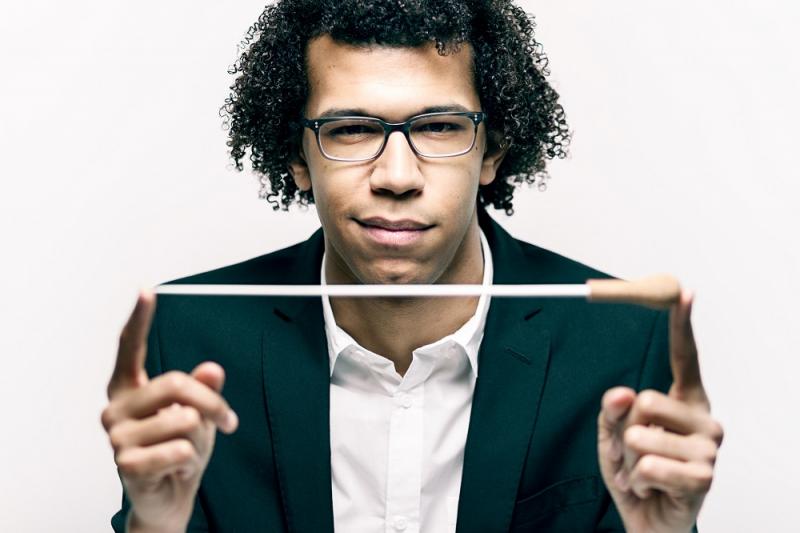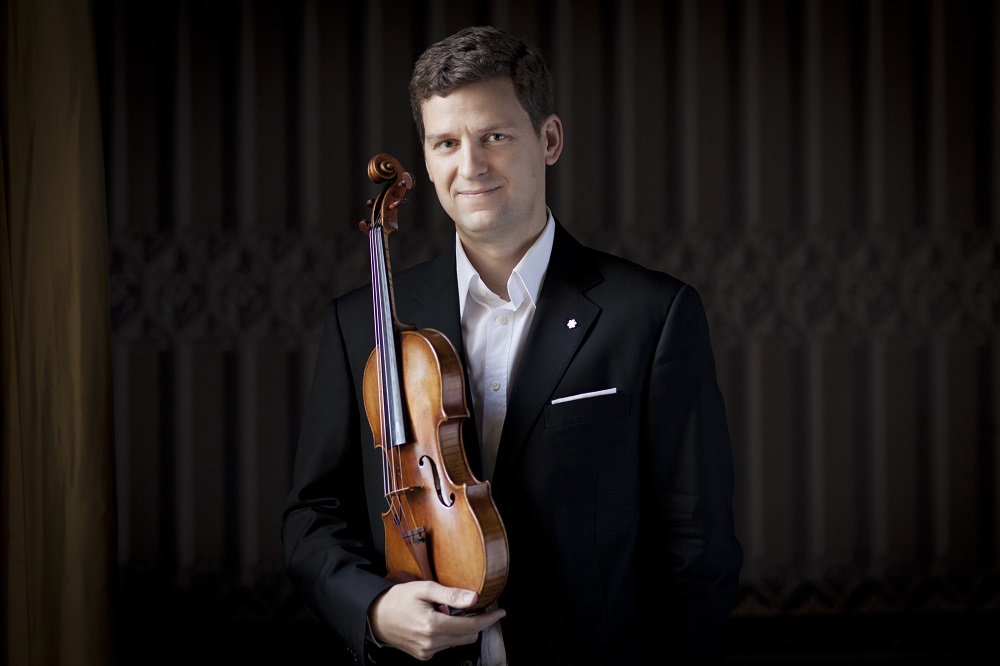Ehnes, Hallé, Elder, Heyward, Bridgewater Hall, Manchester | reviews, news & interviews
Ehnes, Hallé, Elder, Heyward, Bridgewater Hall, Manchester
Ehnes, Hallé, Elder, Heyward, Bridgewater Hall, Manchester
Elder tackles Vaughan Williams' symphonic masterpiece in a generous programme

Two things to note in Thursday’s Hallé performance at the Bridgewater Hall: the debut in the Manchester main series of their highly talented new assistant conductor, Jonathon Heyward, and another stride along the road towards the Hallé/Elder complete edition of the Vaughan Williams symphonies.
So, to begin at the beginning. Heyward is a young American (from Charleston, South Carolina) and completed his studies at the RAM under Sian Edwards. Judging by his handling of Mendelssohn’s Fingal’s Cave Overture, he’s one of those who has simply got it as a conductor. From the articulation of the first note on the bassi, through beautifully judged pacing and phrase shaping, he made the music ebb and flow as it should with both momentum and smoothness. There was a vivid change of instrumental colour in mid-voyage, and the clarinet duet was lovingly played by new Hallé principal Sergio Castelló López and his colleague Jill Allan. Sentimental? Yes, a shade so, but this is early Romanticism and it should be.
Sir Mark Elder took the rostrum for the remainder of the programme, with the Bruch concerto first. It was written for Sarasate, and you can hear the flashes of Zigeunerweise virtuosity - or at least a Teuton’s idea of it - obligingly provided by the composer for his soloist. James Ehnes (pictured below by Benjamin Ealovega) had no hesitation about despatching those, and it also gave opportunity for his impeccable double-stopping to be heard.

The piece is revolutionary and yet not so, beginning with its slow movement and going on to two allegros yet including all the show-off elements expected in 1877, but the opening sonata-form Adagio is still its meatiest. There are little surprises of charm throughout, as Bruch hunts for (but does not entirely find) the sweet longing of his earlier masterpiece. Conductor and soloist gave it their most positive spin, however.
Janáček’s Jealousy (Žárlivost) was originally to have been the overture to Jenůfa. It looks as if he never used it, but it’s based on a folk song with a murderous story that’s reflected in the opera. Elder’s life-blood is still in the theatre, and he relished the evocation of drama and atmosphere that’s evident in this overture – simultaneously catching the lilt of Janáček’s writing in folkish mien. The Hallé brass made crisp, incisive work of their prominent role in the later part of the work.
The Scherzo is the big challenge, rattling along as if to take us all to hell in a handcartIt was the brass again, but in a different style entirely, who were crucial in the opening pages of Vaughan Williams’ Sixth Symphony. It’s the mirror image of a grand-finale symphony, with constant power and fury in the first movement, contrapuntal argument and lighter textures in the middle two, and then a bleak final statement in which no instrument is to play any louder than pianissimo all the way through. The cross-rhythmic writing is intensely complex in many sections of the piece, and one of the greatest virtues of Elder’s reading - and one which will become still more apparent in the recording which is to follow this performance and its rehearsals, I surmise - was the clarity he brought to every page.
VW had started writing film music by the time he put this symphony together, and instantaneous emotional effect is there on almost every page. In this performance there were intensely contrasted characterizations of the main themes, too – the troll-like grotesquerie apparent early in the first movement, the soaring modal hymn to which he brings his second theme, the magic of multi-divided strings in the second movement, and the Holst-like "niente" fade-out at the very end were among those that stayed in the memory.
The Scherzo is the big challenge, rattling along as if to take us all to hell in a handcart, and Elder and the Hallé were on top of that. And then the finale calls for something very sustained and even, letting the changing textures make their impact unaided. The pianissimo brass were vital to that effect, too. This night brought the Hallé’s recorded Vaughan Williams symphonies tally to seven, if I’m not mistaken (No. 4 and of course this one still to appear). Bring on the rest.
rating
Explore topics
Share this article
The future of Arts Journalism
You can stop theartsdesk.com closing!
We urgently need financing to survive. Our fundraising drive has thus far raised £49,000 but we need to reach £100,000 or we will be forced to close. Please contribute here: https://gofund.me/c3f6033d
And if you can forward this information to anyone who might assist, we’d be grateful.

Subscribe to theartsdesk.com
Thank you for continuing to read our work on theartsdesk.com. For unlimited access to every article in its entirety, including our archive of more than 15,000 pieces, we're asking for £5 per month or £40 per year. We feel it's a very good deal, and hope you do too.
To take a subscription now simply click here.
And if you're looking for that extra gift for a friend or family member, why not treat them to a theartsdesk.com gift subscription?
more Classical music
 First Person: clarinettist Oliver Pashley on the new horizons of The Hermes Experiment's latest album
Compositions by members of this unusual quartet feature for the first time
First Person: clarinettist Oliver Pashley on the new horizons of The Hermes Experiment's latest album
Compositions by members of this unusual quartet feature for the first time
 Gesualdo Passione, Les Arts Florissants, Amala Dior Company, Barbican review - inspired collaboration excavates the music's humanity
At times it was like watching an anarchic religious procession
Gesualdo Passione, Les Arts Florissants, Amala Dior Company, Barbican review - inspired collaboration excavates the music's humanity
At times it was like watching an anarchic religious procession
 Classical CDs: Camels, concrete and cabaret
An influential American composer's 90th birthday box, plus British piano concertos and a father-and-son duo
Classical CDs: Camels, concrete and cabaret
An influential American composer's 90th birthday box, plus British piano concertos and a father-and-son duo
 Cockerham, Manchester Camerata, Sheen, Martin Harris Centre, Manchester review - re-enacting the dawn of modernism
Two UK premieres added to three miniatures from a seminal event of January 1914
Cockerham, Manchester Camerata, Sheen, Martin Harris Centre, Manchester review - re-enacting the dawn of modernism
Two UK premieres added to three miniatures from a seminal event of January 1914
 Kempf, Brno Philharmonic, Davies, Bridgewater Hall, Manchester review - European tradition meets American jazz
Bouncing Czechs enjoy their Gershwin and Brubeck alongside Janáček and Dvořák
Kempf, Brno Philharmonic, Davies, Bridgewater Hall, Manchester review - European tradition meets American jazz
Bouncing Czechs enjoy their Gershwin and Brubeck alongside Janáček and Dvořák
 Solomon, OAE, Butt, QEH review - daft Biblical whitewashing with great choruses
Even a top soprano and mezzo can’t make this Handel paean wholly convincing
Solomon, OAE, Butt, QEH review - daft Biblical whitewashing with great choruses
Even a top soprano and mezzo can’t make this Handel paean wholly convincing
 Two-Piano Gala, Kings Place review - shining constellations
London Piano Festival curators and illustrious friends entertain and enlighten
Two-Piano Gala, Kings Place review - shining constellations
London Piano Festival curators and illustrious friends entertain and enlighten
 Echo Vocal Ensemble, Latto, Union Chapel review - eclectic choral programme garlanded with dance
Beautiful singing at the heart of an imaginative and stylistically varied concert
Echo Vocal Ensemble, Latto, Union Chapel review - eclectic choral programme garlanded with dance
Beautiful singing at the heart of an imaginative and stylistically varied concert
 Scott, Irish Baroque Orchestra, Whelan, RIAM, Dublin review - towards a Mozart masterpiece
Characteristic joy and enlightenment from this team, but a valveless horn brings problems
Scott, Irish Baroque Orchestra, Whelan, RIAM, Dublin review - towards a Mozart masterpiece
Characteristic joy and enlightenment from this team, but a valveless horn brings problems
 Classical CDs: Voice flutes, flugelhorns and froth
Baroque sonatas, English orchestral music and an emotionally-charged vocal recital
Classical CDs: Voice flutes, flugelhorns and froth
Baroque sonatas, English orchestral music and an emotionally-charged vocal recital
 Kanneh-Mason, Britten Sinfonia, Shave, Milton Court - a grin and a big beaming smile
A pair of striking contemporary pieces alongside two old favourites
Kanneh-Mason, Britten Sinfonia, Shave, Milton Court - a grin and a big beaming smile
A pair of striking contemporary pieces alongside two old favourites

Add comment